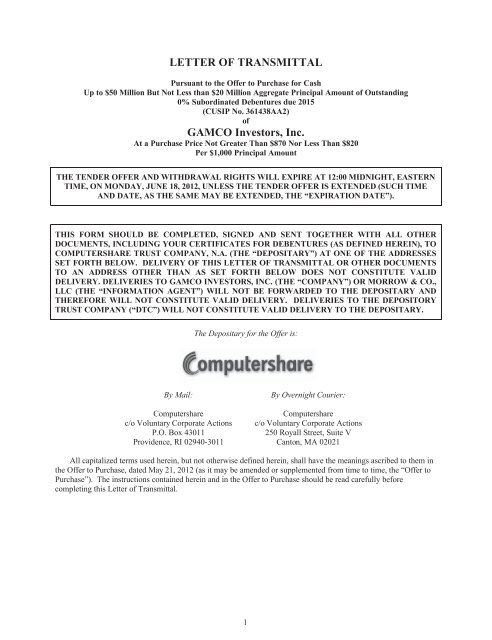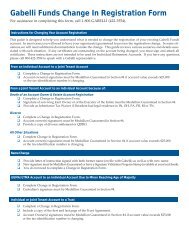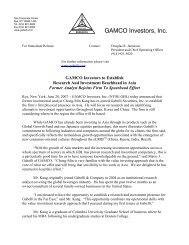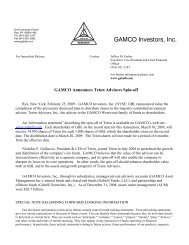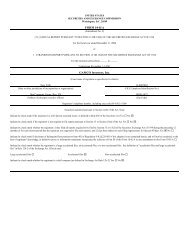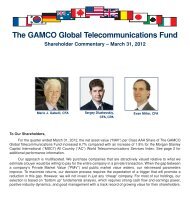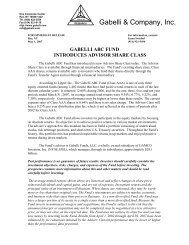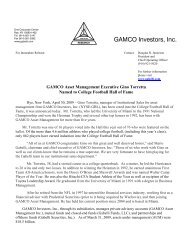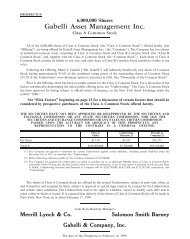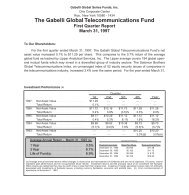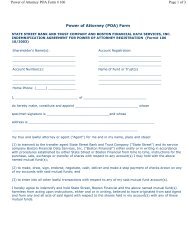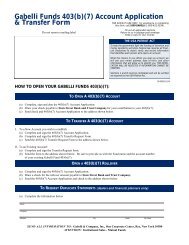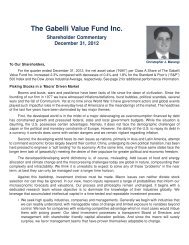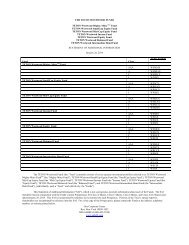LETTER OF TRANSMITTAL GAMCO Investors, Inc. - Gabelli
LETTER OF TRANSMITTAL GAMCO Investors, Inc. - Gabelli
LETTER OF TRANSMITTAL GAMCO Investors, Inc. - Gabelli
Create successful ePaper yourself
Turn your PDF publications into a flip-book with our unique Google optimized e-Paper software.
<strong>LETTER</strong> <strong>OF</strong> <strong>TRANSMITTAL</strong><br />
Pursuant to the Offer to Purchase for Cash<br />
Up to $50 Million But Not Less than $20 Million Aggregate Principal Amount of Outstanding<br />
0% Subordinated Debentures due 2015<br />
(CUSIP No. 361438AA2)<br />
of<br />
<strong>GAMCO</strong> <strong>Investors</strong>, <strong>Inc</strong>.<br />
At a Purchase Price Not Greater Than $870 Nor Less Than $820<br />
Per $1,000 Principal Amount<br />
THE TENDER <strong>OF</strong>FER AND WITHDRAWAL RIGHTS WILL EXPIRE AT 12:00 MIDNIGHT, EASTERN<br />
TIME, ON MONDAY, JUNE 18, 2012, UNLESS THE TENDER <strong>OF</strong>FER IS EXTENDED (SUCH TIME<br />
AND DATE, AS THE SAME MAY BE EXTENDED, THE “EXPIRATION DATE”).<br />
THIS FORM SHOULD BE COMPLETED, SIGNED AND SENT TOGETHER WITH ALL OTHER<br />
DOCUMENTS, INCLUDING YOUR CERTIFICATES FOR DEBENTURES (AS DEFINED HEREIN), TO<br />
COMPUTERSHARE TRUST COMPANY, N.A. (THE “DEPOSITARY”) AT ONE <strong>OF</strong> THE ADDRESSES<br />
SET FORTH BELOW. DELIVERY <strong>OF</strong> THIS <strong>LETTER</strong> <strong>OF</strong> <strong>TRANSMITTAL</strong> OR OTHER DOCUMENTS<br />
TO AN ADDRESS OTHER THAN AS SET FORTH BELOW DOES NOT CONSTITUTE VALID<br />
DELIVERY. DELIVERIES TO <strong>GAMCO</strong> INVESTORS, INC. (THE “COMPANY”) OR MORROW & CO.,<br />
LLC (THE “INFORMATION AGENT”) WILL NOT BE FORWARDED TO THE DEPOSITARY AND<br />
THEREFORE WILL NOT CONSTITUTE VALID DELIVERY. DELIVERIES TO THE DEPOSITORY<br />
TRUST COMPANY (“DTC”) WILL NOT CONSTITUTE VALID DELIVERY TO THE DEPOSITARY.<br />
The Depositary for the Offer is:<br />
By Mail:<br />
Computershare<br />
c/o Voluntary Corporate Actions<br />
P.O. Box 43011<br />
Providence, RI 02940-3011<br />
By Overnight Courier:<br />
Computershare<br />
c/o Voluntary Corporate Actions<br />
250 Royall Street, Suite V<br />
Canton, MA 02021<br />
All capitalized terms used herein, but not otherwise defined herein, shall have the meanings ascribed to them in<br />
the Offer to Purchase, dated May 21, 2012 (as it may be amended or supplemented from time to time, the “Offer to<br />
Purchase”). The instructions contained herein and in the Offer to Purchase should be read carefully before<br />
completing this Letter of Transmittal.<br />
1
List below the 0% Subordinated Debentures due 2015 (the “Debentures”) to which this Letter of Transmittal<br />
relates and either (i) specify the price (in multiples of $5 per $1,000 principal amount) not greater than $870 nor less<br />
than $820 per $1,000 principal amount at which the Debentures are being tendered, or (ii) do not specify a price, in<br />
which case the registered owner of the Debentures (a “Holder”) will accept the Purchase Price selected by the<br />
Company in the Offer. If any specified tender price is not submitted in a whole multiple of $5, such price will be<br />
rounded down to the nearest whole multiple of $5. Each Holder of Debentures should understand that not<br />
specifying a price at which Debentures are being tendered could have the effect of lowering the Purchase Price paid<br />
for Debentures in the Offer and could result in the Holder’s Debentures being purchased at the minimum price of<br />
$820 per $1,000 principal amount. If the space provided below is inadequate, list the certificate numbers, principal<br />
amounts and tender prices of the Debentures being tendered on a separately executed schedule and affix the<br />
schedule to this Letter of Transmittal.<br />
DESCRIPTION <strong>OF</strong> DEBENTURES TENDERED<br />
(See Instructions 4, 5 and 6)<br />
Name(s) and Address(es) of Registered Holder(s) or<br />
Name of DTC Participant and Participant’s<br />
DTC Account Number in which Debentures are Held<br />
(Please fill in blank)<br />
Certificate<br />
Number(s)*<br />
CERTIFICATES ENCLOSED<br />
(attach signed list if necessary)<br />
Principal<br />
Amount of<br />
Debentures<br />
Represented<br />
Principal<br />
Amount of<br />
Debentures<br />
Tendered**<br />
Price at<br />
Which<br />
Debentures<br />
Are Being<br />
Tendered***<br />
Indicate in this box the order (by certificate number or principal amount of Debentures represented if tendering by bookentry<br />
transfer) in which Debentures are to be purchased in the event of proration. If you do not designate an order, in the<br />
event less than all Debentures tendered are purchased due to proration, Debentures will be selected for purchase by the<br />
Depositary. Attach additional signed list if necessary.<br />
1 st : ______________ 2nd: ______________ 3rd: ______________ 4th: ______________<br />
* This column need not be completed by Holders tendering by book-entry transfer.<br />
** Unless otherwise indicated, it will be assumed that the entire aggregate principal amount represented by the<br />
Debentures specified above is being tendered.<br />
*** Each tender price must be in multiples of $5 per $1,000 principal amount, and not greater than $870 nor less than<br />
$820 per $1,000 principal amount in accordance with the terms of the Offer. If any specified tender price is not<br />
submitted in a whole multiple of $5, such price will be rounded down to the nearest whole multiple of $5.<br />
Alternatively, if the Holder wishes to maximize the chance that the Company will purchase the Holder’s Debentures,<br />
the Holder should refrain from specifying a price at which the Holder is tendering its Debentures, in which case, the<br />
Holder will accept the Purchase Price selected by the Company in the Offer. If the Holder agrees to accept the<br />
Purchase Price determined in the Offer, the Holder’s Debentures will be deemed to be tendered at the minimum price<br />
of $820 per $1,000 principal amount. The Holder should understand that this election could have the effect of<br />
lowering the Purchase Price paid for Debentures in the Offer and could result in the Holder’s Debentures being<br />
purchased at the minimum price of $820 per $1,000 principal amount.<br />
The names and addresses of the Holders should be printed exactly as they appear on the certificates representing<br />
Debentures tendered hereby. The Debentures and the principal amount of Debentures represented that the<br />
undersigned wishes to tender should be indicated in the appropriate boxes.<br />
HOLDERS WHO WISH TO BE ELIGIBLE TO RECEIVE THE PURCHASE PRICE PER $1,000<br />
PRINCIPAL AMOUNT <strong>OF</strong> DEBENTURES PURSUANT TO THE <strong>OF</strong>FER MUST VALIDLY TENDER<br />
(AND NOT PROPERLY WITHDRAW) THEIR DEBENTURES ON OR PRIOR TO 12:00 MIDNIGHT,<br />
EASTERN TIME, ON MONDAY, JUNE 18, 2012, UNLESS THE <strong>OF</strong>FER IS EXTENDED.<br />
2
YOU MUST SIGN THIS <strong>LETTER</strong> <strong>OF</strong> <strong>TRANSMITTAL</strong> WHERE INDICATED BELOW AND<br />
COMPLETE THE ACCOMPANYING FORM W-9 OR THE APPROPRIATE INTERNAL REVENUE<br />
SERVICE FORM W-8.<br />
This Letter of Transmittal is to be used by Holders if (i) certificates representing Debentures are to be physically<br />
delivered to the Depositary herewith by Holders or (ii) tender of Debentures is to be made by book-entry transfer to<br />
the Depositary’s account at DTC pursuant to the procedures set forth in the Offer to Purchase under Section 6,<br />
“Procedures for Tendering Debentures — Tender of Debentures Held Through DTC”, by any financial institution<br />
that is a participant in DTC and whose name appears on a security position listing as the owner of Debentures. Even<br />
though delivery of Debentures may be effected through book-entry transfer into the Depositary’s account at DTC, a<br />
properly completed and duly executed Letter of Transmittal, with any required signature guarantee, or an Agent’s<br />
Message in the case of a book-entry transfer, and any other required documentation, must in any case be transmitted<br />
to and received by the Depositary prior to the Expiration Date. If a Holder desires to tender Debentures in the Offer,<br />
but cannot deliver the certificates for its Debentures and all other required documents to the Depositary by the<br />
Expiration Date (as set forth in the Offer to Purchase), or cannot comply with the procedures for book-entry transfer<br />
on a timely basis, then such Holder may tender its Debentures according to the guaranteed delivery procedures set<br />
forth in Section 6, “Procedures for Tendering Debentures” of the Offer to Purchase. See Instruction 2. Delivery of<br />
the Letter of Transmittal and any other required documents to the book-entry transfer facility does not constitute<br />
delivery to the Depositary.<br />
The undersigned has completed, executed and delivered this Letter of Transmittal to indicate the action the<br />
undersigned desires to take with respect to the Offer.<br />
The instructions included with this Letter of Transmittal must be followed. Questions and requests for<br />
assistance or for additional copies of the Offer to Purchase and this Letter of Transmittal must be directed to the<br />
Information Agent at the address and telephone number set forth on the back page of this Letter of Transmittal. See<br />
Instruction 13 below.<br />
Holders that are tendering by book-entry transfer to the Depositary’s account at DTC must execute the tender<br />
through the DTC Automated Tender Offer Program (“ATOP”), for which this Offer will be eligible. DTC<br />
participants that are accepting the Offers must transmit their acceptances to DTC, which will verify the acceptances<br />
and execute a book-entry delivery to the Depositary’s DTC account. DTC will then send an Agent’s Message to the<br />
Depositary for its acceptance.<br />
METHOD <strong>OF</strong> DELIVERY<br />
<br />
<br />
CHECK HERE IF CERTIFICATES FOR TENDERED DEBENTURES ARE ENCLOSED HEREWITH.<br />
CHECK HERE IF TENDERED DEBENTURES ARE BEING DELIVERED BY BOOK-ENTRY TRANSFER<br />
MADE TO THE ACCOUNT MAINTAINED BY THE DEPOSITARY WITH DTC AND COMPLETE THE<br />
FOLLOWING:<br />
Name of Tendering Institution:<br />
Account Number with DTC:<br />
Transaction Code Number:<br />
<br />
CHECK HERE IF DEBENTURES ARE BEING TENDERED PURSUANT TO NOTICE <strong>OF</strong> GUARANTEED<br />
DELIVERY PREVIOUSLY SENT TO THE DEPOSITARY AND COMPLETE THE FOLLOWING:<br />
Name(s) of Registered Holder(s):<br />
Window Ticket No. (if any):<br />
Date of Execution of Notice of Guaranteed Delivery:<br />
3
Name of Institution that Guaranteed Delivery:<br />
If delivery is by book-entry transfer, give the following information:<br />
Account Number of DTC:<br />
Transaction Code Number:<br />
MUTILATED, LOST, STOLEN OR DESTROYED CERTIFICATE(S)<br />
IF ANY CERTIFICATE REPRESENTING DEBENTURES THAT YOU OWN HAS BEEN MUTILATED,<br />
LOST, STOLEN OR DESTROYED, PLEASE CONTACT COMPUTERSHARE TRUST COMPANY, N.A., THE<br />
TRUSTEE FOR THE DEBENTURES (THE “TRUSTEE”), AT 1-877-282-1168 PROMPTLY TO OBTAIN<br />
INSTRUCTIONS AS TO THE STEPS THAT MUST BE TAKEN IN ORDER TO REPLACE THE<br />
CERTIFICATE. THIS <strong>LETTER</strong> <strong>OF</strong> <strong>TRANSMITTAL</strong> AND RELATED DOCUMENTS CANNOT BE<br />
PROCESSED UNTIL THE PROCEDURES FOR REPLACING MUTILATED, LOST, STOLEN OR<br />
DESTROYED CERTIFICATES HAVE BEEN FOLLOWED. PLEASE CONTACT THE TRUSTEE AT 1-877-<br />
282-1168 PROMPTLY TO PERMIT TIMELY PROCESSING <strong>OF</strong> THE REPLACEMENT DOCUMENTATION.<br />
SEE INSTRUCTION 14.<br />
NOTE: SIGNATURES MUST BE PROVIDED BELOW<br />
PLEASE READ THE ACCOMPANYING INSTRUCTIONS CAREFULLY<br />
4
To Computershare Trust Company, N.A.:<br />
The undersigned hereby tenders to the Company the above-described 0% Subordinated Debentures due 2015 of<br />
the Company (the “Debentures”) upon the terms and subject to the conditions set forth in the Offer to Purchase and<br />
this Letter of Transmittal, receipt of which is hereby acknowledged.<br />
Subject to and effective upon the acceptance for purchase of and payment for the principal amount of the<br />
Debentures tendered with this Letter of Transmittal, the undersigned hereby (i) irrevocably sells, assigns and<br />
transfers to, or upon the order of, the Company, all right, title and interest in and to all the Debentures that are being<br />
tendered hereby, waives any and all other rights with respect to such Debentures (including without limitation, any<br />
existing or past defaults and their consequences in respect of the Debentures and the Indenture under which the<br />
Debentures were issued) and releases and discharges the Company from any and all claims such Holders may have<br />
now, or may have in the future, arising out of, or related to, such Debentures, including without limitation, any<br />
claims that such Holder is entitled to receive additional principal or interest payments with respect to such<br />
Debentures, to participate in any redemption or defeasance of the Debentures or to be entitled to any of the benefits<br />
under the Indenture, and (ii) irrevocably constitutes and appoints the Depositary as the true and lawful agent and<br />
attorney-in-fact of the undersigned (with full knowledge that the Depositary also acts as the agent of the Company)<br />
with respect to such Debentures, with full power of substitution and resubstitution (such power-of-attorney being<br />
deemed to be an irrevocable power coupled with an interest) to (a) deliver certificates representing such Debentures,<br />
or transfer ownership of such Debentures, on the account books maintained by DTC, together, in any such case, with<br />
all accompanying evidences of transfer and authenticity, to or upon the order of, the Company, (b) present such<br />
Debentures for transfer of on the security register for the Debentures, and (c) receive all benefits or otherwise<br />
exercise all rights of beneficial ownership of such Debentures, all in accordance with the terms of the Offer.<br />
The undersigned hereby represents and warrants that the undersigned has full power and authority to tender,<br />
sell, assign and transfer the Debentures tendered hereby, and that when such Debentures are accepted for purchase<br />
and payment by the Company, the Company will acquire good title thereto, free and clear of all liens, restrictions,<br />
charges and encumbrances and not subject to any adverse claim or right. The undersigned will, upon request,<br />
execute and deliver any additional documents deemed by the Depositary or the Company to be necessary or<br />
desirable to complete the sale, assignment and transfer of the Debentures tendered hereby.<br />
All authority conferred or agreed to be conferred by this Letter of Transmittal shall survive the death or<br />
incapacity of the undersigned and every obligation of the undersigned under this Letter of Transmittal shall be<br />
binding upon the undersigned’s heirs, personal representatives, executors, administrators, successors, assigns,<br />
trustees in bankruptcy and other legal representatives.<br />
The undersigned understands that the delivery and surrender of the Debentures is not effective, and the risk of<br />
loss of the Debentures does not pass to the Depositary, until receipt by the Depositary of this properly completed<br />
and duly executed Letter of Transmittal, together with all accompanying evidences of authority and any other<br />
required documents in form satisfactory to the Company or receipt of an Agent’s Message. All questions as to the<br />
form of all documents and the validity, eligibility, including time of receipt, acceptance for payment and withdrawal<br />
of tendered Debentures will be determined by the Company, in its sole discretion, and its determination will be final<br />
and binding. The Company reserves the absolute right to reject any and all tenders of Debentures that it determines<br />
are not in proper form or the acceptance for payment of or payment for which may be unlawful. The Company also<br />
reserves the absolute right in its sole discretion to waive any of the conditions of the Offer, provided that in the event<br />
that a condition is waived with respect to any particular Holder, the same condition will be waived with respect to all<br />
Holders. Further, the Company reserves the absolute right in its sole discretion to waive any defect or irregularity in<br />
the tender of Debentures of any particular Holder, whether or not similar defects or irregularities are waived in the<br />
case of other Holders. The Company’s interpretation of the terms and conditions of the Offer (including the Letter<br />
of Transmittal and the instructions thereto) will be final and binding. No tender of Debentures will be deemed to be<br />
properly made until all defects and irregularities have been cured or waived. Unless waived, any defects or<br />
irregularities in connection with tenders must be cured within such time as the Company shall determine.<br />
The undersigned further understands that:<br />
5
1. the valid tender of Debentures pursuant to any of the procedures described in Section 6 of the Offer to<br />
Purchase and in the instructions to this Letter of Transmittal constitutes the undersigned’s acceptance of the<br />
terms and conditions of the Offer; the Company will be deemed to have accepted for payment, and thereby<br />
purchased, Debentures that are validly tendered at prices at or below the Purchase Price that are not properly<br />
withdrawn prior to the Expiration Date, subject to proration and conditional tender provisions of the Offer, only<br />
when, as and if the Company gives written notice to the Depositary of the Company’s acceptance of the<br />
Debentures for payment under the Offer; the Company’s acceptance of the Debentures will constitute a binding<br />
agreement between the undersigned and the Company on the terms and subject to the conditions of the Offer;<br />
2. it is a violation of Rule 14e-4 promulgated under the Securities Exchange Act of 1934, as amended (the<br />
“Exchange Act”), for a person acting alone or in concert with others, directly or indirectly, to tender Debentures<br />
for such person’s own account unless at the time of tender and at the Expiration Date such person has a “net<br />
long position” in (i) the Debentures that is equal to or greater than the amount tendered and will deliver or cause<br />
to be delivered such Debentures for the purpose of tender to the Company within the period specified in the<br />
Offer, or (ii) other securities immediately convertible into, exercisable for or exchangeable into Debentures<br />
(“Equivalent Securities”) that is equal to or greater than the amount tendered and, upon the acceptance of such<br />
tender, will acquire such Debentures by conversion, exchange or exercise of such Equivalent Securities to the<br />
extent required by the terms of the Offer and will deliver or cause to be delivered such Debentures so acquired<br />
for the purpose of tender to the Company within the period specified in the Offer. Rule 14e-4 also provides a<br />
similar restriction applicable to the tender or guarantee of a tender on behalf of another person. A tender of<br />
Debentures made pursuant to any method of delivery set forth in this Letter of Transmittal will constitute the<br />
tendering Holder’s representation and warranty to the Company that (a) such Holder has a “net long position” in<br />
Debentures or Equivalent Securities being tendered within the meaning of Rule 14e-4, and (b) such tender of<br />
Debentures complies with Rule 14e-4. The Company’s acceptance for payment of Debentures tendered<br />
pursuant to the Offer will constitute a binding agreement between the tendering Holder and the Company upon<br />
the terms and subject to the conditions of the Offer;<br />
3. the Company will, under the “Modified Dutch Auction” procedure set forth in the Offer to Purchase,<br />
determine the single price, not greater than $870 nor less than $820, net to the seller in cash, without interest,<br />
that the Company will pay per $1,000 principal amount for Debentures validly tendered and not properly<br />
withdrawn from the Offer prior to the Expiration Date, taking into account the total amount of Debentures<br />
tendered and the prices specified by tendering Holders;<br />
4. the Purchase Price will be the lowest purchase price within the indicated range that will enable the<br />
Company to purchase $50 million aggregate principal amount of Debentures pursuant to the Offer, or such<br />
lesser principal amount of Debentures as are validly tendered and not properly withdrawn prior to the<br />
Expiration Date;<br />
5. the Company reserves the right, in its sole discretion, to purchase more than $50 million aggregate<br />
principal amount of Debentures in the Offer, and/or to amend the maximum aggregate purchase price, or to<br />
amend the Offer in any other respect, subject to applicable law;<br />
6. tenders of Debentures may be withdrawn by written notice of withdrawal received by the Depositary at<br />
any time prior to the Expiration Date, but no consideration will be payable in respect of Debentures so<br />
withdrawn;<br />
7. all Debentures validly tendered prior to the Expiration Date at or below the Purchase Price and not<br />
properly withdrawn prior to the Expiration Date will be purchased at the Purchase Price, net to the seller in<br />
cash, without interest, upon the terms and subject to the conditions of the Offer, including the Minimum Tender<br />
Condition, the proration procedures (because more than the amount of Debentures sought are validly tendered)<br />
and conditional tender procedures described in the Offer to Purchase;<br />
8. the Company will return at its expense any principal amount of Debentures tendered but not purchased<br />
pursuant to the Offer (including amounts not purchased because of proration or conditional tender provisions) to<br />
6
the tendering Holders promptly following the earlier of the Expiration Date or the date on which the Offer is<br />
terminated;<br />
9. under the circumstances set forth in the Offer to Purchase, the Company expressly reserves the right, in<br />
its sole discretion, but subject to applicable law, to (i) waive any and all of the conditions of the Offer, other<br />
than those dependent upon the receipt of necessary government approvals, prior to the Expiration Date,<br />
(ii) extend the Expiration Date, (iii) amend the terms of the Offer and/or (iv) terminate the Offer and not accept<br />
for payment any Debentures tendered in the Offer. Any extension, amendment or termination will be followed<br />
as promptly as practicable by a public announcement thereof, such announcement in the case of an extension to<br />
be issued no later than 9:00 a.m., Eastern Time, on the first business day following the previously scheduled<br />
Expiration Date. During any such extension, all Debentures previously tendered and not properly withdrawn<br />
prior to the Expiration Date will remain subject to the Offer and to the rights of a tendering Holder to withdraw<br />
such Holder’s Debentures;<br />
10. the Company has advised the undersigned to consult with the undersigned’s own advisors as to the<br />
consequences of tendering Debentures pursuant to the Offer; and<br />
11. THE <strong>OF</strong>FER IS NOT BEING MADE TO, NOR WILL TENDERS <strong>OF</strong> DEBENTURES BE<br />
ACCEPTED FROM OR ON BEHALF <strong>OF</strong>, HOLDERS IN ANY JURISDICTION IN WHICH THE<br />
MAKING OR ACCEPTANCE <strong>OF</strong> THE <strong>OF</strong>FER WOULD NOT BE IN COMPLIANCE WITH THE<br />
LAWS <strong>OF</strong> THAT JURISDICTION.<br />
The undersigned agrees to all of the terms and conditions of the Offer.<br />
Unless otherwise indicated under “Special Payment Instructions” below, please issue a check from the<br />
Depositary for the Purchase Price for any Debentures tendered hereby that are purchased and/or return any<br />
certificates representing Debentures not tendered or not accepted for purchase in the name(s) of the Holder(s)<br />
appearing under “Description of Debentures Tendered”. Similarly, unless otherwise indicated under “Special<br />
Delivery Instructions”, please mail the check for the Purchase Price for any Debentures tendered hereby that are<br />
purchased and/or return any certificates representing Debentures not tendered or not accepted for purchase (and<br />
accompanying documents, as appropriate) to the address(es) of the Holder(s) appearing under “Description of<br />
Debentures Tendered”. In the event that both the Special Payment Instructions and the Special Delivery Instructions<br />
are completed, please issue the check for the Purchase Price for any Debentures tendered hereby that are purchased<br />
and/or return any certificates representing Debentures not tendered or not accepted for purchase (and any<br />
accompanying documents, as appropriate) to the person or persons so indicated. In the case of a book-entry delivery<br />
of Debentures, please credit the account maintained at DTC with any Debentures not tendered or not accepted for<br />
purchase. The undersigned recognizes that the Company does not have any obligation pursuant to the Special<br />
Payment Instructions to transfer any Debentures from the name of the Holder thereof if the Company does not<br />
accept for purchase any of the Debentures so tendered.<br />
7
PLEASE SIGN HERE<br />
(To Be Completed By All Tendering Holders Regardless of Whether Debentures Are Being Physically<br />
Delivered Herewith, Unless an Agent’s Message Is Delivered In Connection With a Book-Entry Transfer of<br />
Such Debentures)<br />
This Letter of Transmittal must be signed by the registered holder(s) of Debentures exactly as their name(s)<br />
appear(s) on certificate(s) for Debentures or, if tendered by the registered holder(s) of Debentures exactly as such<br />
participant’s name(s) appears on a security position listing as the owner of Debentures, or by person(s) authorized to<br />
become registered holder(s) by endorsements and documents transmitted with this Letter of Transmittal. If the<br />
signature is by a trustee, executor, administrator, guardian, attorney-in-fact, officer or other person acting in a<br />
fiduciary or representative capacity, such person must set forth his or her full title below under “Capacity” and<br />
submit evidence satisfactory to the Company of such person’s authority to so act. See Instruction 8 below.<br />
If the signature appearing below is not of the registered holder(s) of the Debentures, then the registered<br />
holder(s) must sign a valid proxy.<br />
X ___________________________________________________________________________________________<br />
X ___________________________________________________________________________________________<br />
(Signature(s) of Holder(s) or Authorized Signatory(ies))<br />
Dated: _____, 2012.<br />
Name(s):<br />
_____________________________________________________________________________________________<br />
_____________________________________________________________________________________________<br />
(Please Print)<br />
Capacity: _____________________________________________________________________________________<br />
Address: _____________________________________________________________________________________<br />
_____________________________________________________________________________________________<br />
(<strong>Inc</strong>luding Zip Code)<br />
Area Code and Telephone No.: ____________________________________________________________________<br />
Tax Identification or Social Security Number: ________________________________________________________<br />
8
PLEASE COMPLETE ACCOMPANYING FORM W-9<br />
SIGNATURE GUARANTEE<br />
(See Instructions 1 and 9 below)<br />
_____________________________________________________________________________________________<br />
(Name of Medallion Signature Guarantor Guaranteeing Signature)<br />
_____________________________________________________________________________________________<br />
(Address (including zip code) and Telephone Number (including area code) of Firm)<br />
_____________________________________________________________________________________________<br />
(Authorized Signature)<br />
_____________________________________________________________________________________________<br />
(Printed Name)<br />
_____________________________________________________________________________________________<br />
(Title)<br />
Date: ______, 2012.<br />
9
CONDITIONAL TENDERS<br />
(See Instruction 7)<br />
A Holder may tender Debentures subject to the condition that a specified minimum principal amount of such<br />
Holder’s Debentures tendered pursuant to this Letter of Transmittal must be purchased if the Company purchases<br />
any amount of such Debentures, all as described in the Offer to Purchase, particularly in Section 3 thereof. Unless<br />
the Company purchases the minimum principal amount of Debentures indicated below in the Offer, it will not<br />
purchase any amount of the Debentures tendered by the undersigned. It is the responsibility of the tendering Holder<br />
to calculate that minimum principal amount of Debentures that must be purchased if any are purchased, and the<br />
Company urges Holders to consult their own investment and tax advisors with respect to such election.<br />
Unless the box below has been checked and a minimum principal amount specified, the tender will be deemed<br />
unconditional.<br />
<br />
The minimum principal amount of Debentures that must be purchased, if any amount is purchased, is:<br />
$_______________________<br />
If, because of proration, the minimum principal amount of Debentures indicated will not be purchased, the Company<br />
may accept conditional tenders by random lot, if necessary. However, to be eligible for purchase by random lot, the<br />
tendering stockholder must have tendered the entire outstanding principal amount of his or her Debentures and<br />
checked the box below.<br />
<br />
The tendered Debentures represent the entire outstanding principal amount of Debentures held by the<br />
undersigned.<br />
10
SPECIAL DELIVERY INSTRUCTIONS<br />
(See Instructions 1, 6, 8, 9 and 10)<br />
To be completed ONLY if certificates for Debentures not tendered or purchased and/or checks constituting<br />
payments for Debentures to be purchased in connection with the Offer are to be issued to the order of someone other<br />
than the person or persons whose signature(s) appear(s) within this Letter of Transmittal or if Debentures tendered<br />
hereby and delivered by book-entry transfer which are not purchased are to be returned by credit to an account or the<br />
Book-Entry Transfer Facility other than that designated above.<br />
Issue<br />
Check<br />
Certificate(s) to:<br />
Name: _______________________________________________________________________________________<br />
(Please Print)<br />
Address: _____________________________________________________________________________________<br />
_____________________________________________________________________________________________<br />
(Please Print)<br />
_____________________________________________________________________________________________<br />
(Zip Code)<br />
_____________________________________________________________________________________________<br />
Taxpayer Identification or Social Security Number<br />
(See Accompanying Form W-9)<br />
Credit Debentures delivered by book-entry transfer and not purchased to the account set forth below:<br />
Account Number __________________________________________________________________________<br />
SPECIAL PAYMENT INSTRUCTIONS<br />
(See Instructions 1, 6, 8, 9 and 10)<br />
To be completed ONLY if certificates for Debentures in a principal amount not tendered or not accepted for<br />
purchase and/or checks constituting payment for Debentures to be purchased in connection with the Offer are to be<br />
sent to someone other than the person or persons whose signature(s) appear(s) within this Letter of Transmittal or to<br />
an address different from that shown in the box entitled “Description of Debentures Tendered” within this Letter of<br />
Transmittal.<br />
Issue<br />
Check<br />
Certificate(s) to:<br />
Name: _______________________________________________________________________________________<br />
(Please Print)<br />
Address: _____________________________________________________________________________________<br />
_____________________________________________________________________________________________<br />
(Please Print)<br />
_____________________________________________________________________________________________<br />
(Zip Code)<br />
11
INSTRUCTIONS<br />
Forming Part of the Terms and Conditions of the Offer<br />
1. Guarantee of Signatures. No signature guarantee is required if the Debentures tendered are tendered and<br />
delivered (i) by a registered holder of Debentures (or by a participant in DTC whose name appears on a security<br />
position listing as the owner of such Debentures) who has not completed any of the boxes entitled “Special<br />
Delivery/Payment Instructions” on the Letter of Transmittal, or (ii) for the account of a member firm of a registered<br />
national securities exchange, a member of the National Association of Securities Dealers, <strong>Inc</strong>. or a commercial bank<br />
or trust company having an office or correspondent in the United States (each of the foregoing being referred to as<br />
an “Eligible Institution”). If the Debentures are registered in the name of a person other than the signer of the Letter<br />
of Transmittal or if Debentures not accepted for payment or not tendered are to be returned to a person other than the<br />
registered holder, then the signature on this Letter of Transmittal accompanying the tendered Debentures must be<br />
guaranteed by a recognized participant in the Securities Transfer Agents Medallion Program (a “Medallion<br />
Signature Guarantor”). Beneficial owners whose Debentures are registered in the name of a broker, dealer,<br />
commercial bank, trust company or other nominee must contact such broker, dealer, commercial bank, trust<br />
company or other nominee if they desire to tender Debentures with respect to Debentures so registered. See Section<br />
6, “Procedures for Tendering Debentures”, in the Offer to Purchase.<br />
2. Requirements of Tender. This Letter of Transmittal is to be completed by Holders of Debentures if<br />
certificates representing such Debentures are to be forwarded herewith, or if delivery of such certificates is to be<br />
made by book-entry transfer to the account maintained by DTC, pursuant to the procedures set forth in the Offer to<br />
Purchase under Section 6, “Procedures for Tendering Debentures”. For a Holder to validly tender Debentures<br />
pursuant to the Offer, a properly completed and duly executed Letter of Transmittal, with any required signature<br />
guarantee, or in the case of a book-entry transfer, an Agent’s Message (as defined below) in lieu of the Letter of<br />
Transmittal, and any other required documents, must be received by the Depositary at its address set forth herein on<br />
or before the Expiration Date. In addition, on or before the Expiration Date (including through compliance with the<br />
procedure for guaranteed delivery), either: (i) certificates for tendered Debentures must be received by the<br />
Depositary at such address; or (ii) such Debentures must be transferred pursuant to the procedures for book-entry<br />
transfer described in the Offer to Purchase under Section 6, “Procedures for Tendering Debentures”, and a Book-<br />
Entry Confirmation must be received by the Depositary.<br />
If a Holder desires to tender Debentures pursuant to the Offer and (i) certificates representing such Debentures<br />
are not immediately available, (ii) time will not permit such Holder’s Letter of Transmittal, certificates representing<br />
such Debentures and all other required documents to reach the Depositary on or prior to the Expiration Date, or<br />
(iii) the procedures for book-entry transfer (including delivery of an Agent’s Message) cannot be completed on or<br />
prior to the Expiration Date, such Holder may nevertheless tender such Debentures with the effect that such tender<br />
will be deemed to have been received on or prior to the Expiration Date if all the following conditions are satisfied:<br />
(a) the tender is made by or through an Eligible Institution; (b) a properly completed and duly executed Notice of<br />
Guaranteed Delivery or an Agent’s Message with respect to guaranteed delivery that is accepted by the Company is<br />
received by the Depositary on or prior to the Expiration Date; and (c) the certificates for the tendered Debentures, in<br />
proper form for transfer (or a Book-Entry Confirmation of the transfer of such Debentures into the Depositary’s<br />
account at DTC as described above), together with a properly completed and duly executed Letter of Transmittal,<br />
with any signature guarantees and any other documents required by the Letter of Transmittal or a properly<br />
transmitted Agent’s Message, are received by the Depositary within three business days after the date of execution<br />
of the Notice of Guaranteed Delivery. The Notice of Guaranteed Delivery must be delivered to the Depositary by<br />
mail or overnight courier and must include a guarantee by an Eligible Institution in the form set forth in the Notice<br />
of Guaranteed Delivery.<br />
Letters of Transmittal and Debentures must be sent to the Depositary. Documents sent to the Company, the<br />
Information Agent or the Book-Entry Transfer Facility will not be forwarded to the Depositary and will not be<br />
deemed validly tendered by the Holder thereof.<br />
The method of delivery of Debentures, the Letter of Transmittal and all other required documents to the<br />
Depositary is at the election and risk of the Holder tendering Debentures. Delivery of such documents will be<br />
12
deemed made only when actually received by the Depositary. If such delivery is by mail, it is suggested that the<br />
Holder use properly insured, registered mail with return receipt requested, and that the mailing be made sufficiently<br />
in advance of the Expiration Date to permit delivery to the Depositary on or prior to the Expiration Date.<br />
3. Withdrawal of Tenders; Amendment and Extension. A tender of Debentures pursuant to the Offer may be<br />
withdrawn at any time on or before the Expiration Date (as it may be extended from time to time). Except as<br />
otherwise provided in this Letter of Transmittal or in the Offer to Purchase, tenders of Debentures pursuant to the<br />
Offer are irrevocable.<br />
Holders who have validly withdrawn their previously tendered Debentures may re-tender Debentures at any<br />
time on or before the Expiration Date, by following one of the procedures described in Section 6 “Procedures for<br />
Tendering Debentures” of the Offer to Purchase. In the event of a termination of the Offer, the Debentures tendered<br />
pursuant to the Offer will be promptly returned to the tendering Holder.<br />
For a withdrawal of Debentures to be valid, a written notice of withdrawal must be timely received by the<br />
Depositary at its address. The withdrawal notice must:<br />
• specify the name of the person who tendered the Debentures to be withdrawn;<br />
• specify the amount of the Debentures to be withdrawn;<br />
• specify the certificate numbers shown on the particular certificates evidencing such Debentures and the<br />
aggregate principal amount represented by such Debentures; and<br />
• be signed by the Holder of such Debentures in the same manner as the original signature on the Letter<br />
of Transmittal, including any required signature guarantees.<br />
In addition, any such notice of withdrawal must specify, in the case of Debentures tendered by delivery of<br />
certificates for such Debentures, the name of the registered holder, if different from that of the tendering Holder or,<br />
in the case of Debentures tendered by book-entry transfer, the name and number of the account at DTC to be<br />
credited with the withdrawn Debentures, and otherwise must comply with DTC’s procedures. The signature on the<br />
notice of withdrawal must be guaranteed by an Eligible Institution unless such Debentures have been tendered for<br />
the account of an Eligible Institution. If certificates for the Debentures to be withdrawn have been delivered or<br />
otherwise identified to the Depositary, a signed notice of withdrawal will be effective immediately upon receipt by<br />
the Depositary of a written notice of withdrawal even if physical release is not yet effected. Any Debentures validly<br />
withdrawn will be deemed to be not validly tendered for purposes of the Offer. Withdrawals of Debentures can be<br />
accomplished only in accordance with the foregoing procedures.<br />
All questions as to the form and validity, including time of receipt, of notices of withdrawal of tenders will be<br />
determined by the Company, in its sole discretion, which determination will be final and binding. None of the<br />
Company, the Depositary, the Information Agent or the Trustee or any other person will be under any duty to give<br />
notification of any defects or irregularities in any notices of withdrawal or be subject to any liability for failure to<br />
give any such notification.<br />
If any tendered Debentures are not purchased pursuant to the Offer for any reason, including Debentures<br />
tendered pursuant to the Offer at prices greater than the Purchase Price and Debentures not purchased because of<br />
proration or conditional tender provisions, or because certificates are submitted evidencing more Debentures than<br />
are tendered in the Offer, the Debentures not purchased will be returned at the Company’s expense, to the tendering<br />
Holder (or, in the case of Debentures tendered by book-entry transfer, those Debentures will be credited to the<br />
account maintained at DTC from which those Debentures were delivered), unless otherwise requested by such<br />
Holder under “Special Delivery Instructions” in this Letter of Transmittal, promptly following the Expiration Date<br />
or termination of the Offer.<br />
If the Company materially changes the terms of the Offer or the information concerning the Offer, or if the<br />
Company waives a material condition to the Offer, the Company will disseminate additional information and extend<br />
13
the Offer to the extent required by law. In addition, the Company may, if it deems appropriate, extend the Offer for<br />
any other reason. If the Company purchases an additional amount of Debentures not exceeding 2% of the<br />
outstanding principal amount of the Debentures (approximately $1.7 million principal amount as of May 16, 2012),<br />
pursuant to Exchange Act Rule 13e-4(f)(1)(ii), this will not be deemed a material change to the terms of the Offer,<br />
and the Company will not be required to amend or extend the Offer. In addition, if the consideration to be paid in<br />
the Offer is increased or decreased or the principal amount of Debentures subject to the Offer is increased or<br />
decreased, the Offer will remain open at least 10 business days from the date the Company first gives notice of such<br />
increase or decrease to Holders of Debentures subject to the Offer, by press release or otherwise. See Section 4,<br />
“Amendment; Extension; Waiver; Termination” of the Offer to Purchase.<br />
4. Inadequate Space. If the space provided in the box entitled “Description of Debentures Tendered” is<br />
inadequate, the certificate numbers and/or the number of Debentures should be listed on a separate signed schedule<br />
and attached to this Letter of Transmittal.<br />
5. Indication of Price at which Debentures are being Tendered. Each tender price specified by a Holder in the<br />
column entitled “Price at Which Debentures Are Being Tendered” in the box entitled “Description of Debentures<br />
Tendered” herein must be in multiples of $5 per $1,000 principal amount, and not greater than $870 nor less than<br />
$820 per $1,000 principal amount in accordance with the terms of the Offer. If any specified tender price is not<br />
submitted in a whole multiple of $5, such price will be rounded down to the nearest whole multiple of $5.<br />
Alternatively, if the Holder wishes to maximize the chance that the Company will purchase the Holder’s<br />
Debentures, the Holder should refrain from specifying a price at which the Holder is tendering its Debentures, in<br />
which case, the Holder will accept the Purchase Price selected by the Company in the Offer. If the Holder agrees to<br />
accept the Purchase Price determined in the Offer, the Holder’s Debentures will be deemed to be tendered at the<br />
minimum price of $820 per $1,000 principal amount. The Holder should understand that this election could have<br />
the effect of lowering the Purchase Price paid for Debentures in the Offer and could result in the Holder’s<br />
Debentures being purchased at the minimum price of $820 per $1,000 principal amount.<br />
6. Partial Tenders. Tenders of Debentures pursuant to the Offer will be accepted only in principal amounts<br />
equal to $1,000 or integral multiples thereof. If less than the entire principal amount of any Debentures evidenced<br />
by a submitted certificate is tendered, the tendering Holder must fill in the principal amount tendered in the column<br />
entitled “Principal Amount of Debentures Tendered” in the box entitled “Description of Debentures Tendered”<br />
herein. The entire principal amount represented by the certificates for all Debentures delivered to the Depositary<br />
will be deemed to have been tendered unless otherwise indicated. If the entire principal amount of all Debentures is<br />
not tendered or not accepted for purchase, certificates for the principal amount of Debentures not tendered or not<br />
accepted for purchase will be sent (or, if tendered by book-entry transfer, returned by credit to the account at DTC<br />
designated herein) to the Holder unless otherwise provided in the appropriate box in this Letter of Transmittal (see<br />
Instruction 9) promptly after the Debentures are accepted for purchase.<br />
7. Conditional Tenders. As described in Section 3 and Section 8 of the Offer to Purchase, you may condition<br />
your tender on all or a minimum principal amount of your Debentures being purchased. To make a conditional<br />
tender, you must indicate this in the box captioned “Conditional Tenders” in this Letter of Transmittal and, if<br />
applicable, in the Notice of Guaranteed Delivery and must indicate the minimum principal amount of your<br />
Debentures that must be purchased from you if the Company purchases any amount of such Debentures.<br />
As discussed in Section 3 and Section 8 of the Offer to Purchase, proration may affect whether the Company<br />
accepts conditional tenders and may result in Debentures tendered conditionally at or below the Purchase Price not<br />
being purchased if the required minimum principal amount of Debentures would not be purchased. If, because of<br />
proration, the minimum principal amount of your Debentures that you indicated will not be purchased, the Company<br />
may accept conditional tenders by random lot, if necessary. However, to be eligible for purchase by random lot, you<br />
must have tendered the entire outstanding principal amount of your Debentures and checked the box to indicate that.<br />
Upon the selection by lot, if any, the Company will limit the purchase in each case to the designated minimum<br />
principal amount of Debentures.<br />
14
All tendered Debentures will be deemed unconditionally tendered unless the “Conditional Tender” box is<br />
checked and appropriately completed. You should consult your own investment and tax advisors with respect to<br />
such election.<br />
8. Signatures on this Letter of Transmittal, Bond Powers and Endorsement; Guarantee of Signatures. If this<br />
Letter of Transmittal is signed by the registered holder(s) of the Debentures tendered hereby, the signature(s) must<br />
correspond with the name(s) as written on the face of the certificate(s) without alteration, enlargement or any change<br />
whatsoever. If this Letter of Transmittal is signed by a participant in DTC whose name is shown as the owner of the<br />
Debentures tendered hereby, the signature must correspond with the name shown on the security position listing the<br />
owner of the Debentures.<br />
IF THIS <strong>LETTER</strong> <strong>OF</strong> <strong>TRANSMITTAL</strong> IS EXECUTED BY A HOLDER <strong>OF</strong> DEBENTURES WHO IS NOT<br />
THE REGISTERED HOLDER, THEN THE REGISTERED HOLDER MUST SIGN A VALID PROXY, WITH<br />
THE SIGNATURE <strong>OF</strong> SUCH REGISTERED HOLDER GUARANTEED BY A MEDALLION SIGNATURE<br />
GUARANTOR, UNLESS THE SIGNATURE IS THAT <strong>OF</strong> AN ELIGIBLE INSTITUTION.<br />
If any of the Debentures tendered hereby are owned of record by two or more joint owners, all such owners<br />
must sign the Letter of Transmittal. If any tendered Debentures are registered in different names on several<br />
certificates, it will be necessary to complete, sign and submit as many separate copies of this Letter of Transmittal<br />
and any necessary accompanying documents as there are different names in which certificates are held.<br />
If this Letter of Transmittal is signed by the registered holder, the certificates for any principal amount of<br />
Debentures not tendered or accepted for purchase are to be issued (or if any principal amount of Debentures that is<br />
not tendered or not accepted for purchase is to be reissued or returned) to or, if tendered by book-entry transfer,<br />
credited to the account at DTC of the registered holder, and checks constituting payments for Debentures to be<br />
purchased in connection with the Offer are to be issued to the order of the registered holder, then the registered<br />
holder need not endorse any certificates for tendered Debentures, nor provide a separate bondpower. In any other<br />
case (including if this Letter of Transmittal is not signed by the registered holder), the registered holder must either<br />
properly endorse the certificates for Debentures tendered or transmit a separate properly completed bond power with<br />
this Letter of Transmittal, in either case, executed exactly as the names of the registered holders appear on such<br />
Debentures, and, with respect to a participant in DTC whose name appears on a security position listing as the owner<br />
of Debentures, exactly as the names of the participants appear on such security position listing, with the signature on<br />
the endorsement or bond power guaranteed by a Medallion Signature Guarantor, unless such certificates or bond<br />
powers are executed by an Eligible Institution. See Instruction 1.<br />
If this Letter of Transmittal or any certificates of Debentures or bond powers are signed by trustees, executors,<br />
administrators, guardians, attorneys-in-fact, officers of corporations or others acting in a fiduciary or representative<br />
capacity, such persons should so indicate when signing. The proper evidence satisfactory to the Company of their<br />
authority to so act must be submitted with this Letter of Transmittal.<br />
When this Letter of Transmittal is signed by the registered holders of the Debentures listed and transmitted<br />
hereby, no endorsements of Debentures or separate instruments of transfer are required unless payment is to be<br />
made, or Debentures not tendered or purchased are to be issued, to a person other than the registered holder(s), in<br />
which case the signatures on such Debentures or instruments of transfer must be guaranteed by a Medallion<br />
Signature Guarantor.<br />
Endorsements on certificates for Debentures, signatures on bond powers and proxies provided in accordance<br />
with this Instruction 8 by registered holders not executing this Letter of Transmittal must be guaranteed by a<br />
Medallion Signature Guarantor. See Instruction 1.<br />
9. Special Payment and Special Delivery Instructions. Tendering Holders should indicate in the applicable box<br />
or boxes the name and address to which Debentures for principal amounts not tendered or not accepted for purchase<br />
or checks constituting payments for Debentures to be purchased in connection with the Offer are to be issued or<br />
sent, if different from the name and address of the registered holder signing this Letter of Transmittal. In the case of<br />
issuance in a different name, the taxpayer identification or social security number of the person named must also be<br />
indicated. If no instructions are given, Debentures not tendered or not accepted for purchase will be returned to the<br />
15
egistered holder of the Debentures tendered. For Holders of Debentures tendering by book-entry transfer,<br />
Debentures not tendered or not accepted for purchase will be returned by crediting the account at DTC designated<br />
above.<br />
10. Transfer Taxes. The Company will pay all transfer taxes applicable to the purchase and transfer of<br />
Debentures pursuant to the Offer except in the case of deliveries of certificates for Debentures for principal amounts<br />
not tendered or not accepted for payment that are registered or issued in the name of any person other than the<br />
registered holder of Debentures tendered hereby. Except as provided in this Instruction 10, it will not be necessary<br />
for transfer stamps to be affixed to the certificates listed in this Letter of Transmittal.<br />
11. Irregularities. All questions as to the form of all documents and the validity, eligibility, including time of<br />
receipt, acceptance for payment and withdrawal of tendered Debentures will be determined by the Company, in its<br />
sole discretion, and its determination will be final and binding. The Company reserves the absolute right to reject<br />
any and all tenders of Debentures that it determines are not in proper form or the acceptance for payment of or<br />
payment for which may be unlawful. The Company also reserves the absolute right in its sole discretion to waive<br />
any of the conditions of the Offer or any defect or irregularity in the tender of Debentures of any particular Holder,<br />
whether or not similar defects or irregularities are waived in the case of other Holders. In the event that a condition<br />
is waived with respect to any particular Holder, the same condition will be waived with respect to all Holders. The<br />
Company’s interpretation of the terms and conditions of the Offer (including the Letter of Transmittal and the<br />
instructions thereto) will be final and binding. No tender of Debentures will be deemed to be properly made until all<br />
defects and irregularities have been cured or waived. Unless waived, any defects or irregularities in connection with<br />
tenders must be cured within such time as the Company shall determine. None of the Company, the Depositary, the<br />
Information Agent or the Trustee or any other person will be under any duty to give notification of any defects or<br />
irregularities in any notices of withdrawal or be subject to any liability for failure to give any such notification.<br />
12. Waiver of Conditions. The Company expressly reserves the right, in its sole discretion, but subject to<br />
applicable law, to waive any and all of the conditions of the Offer, other than those dependent upon the receipt of<br />
necessary government approvals, prior to the Expiration Date.<br />
13. Requests for Assistance or Additional Copies. Questions relating to the procedure for tendering Debentures<br />
and requests for assistance or additional copies of the Offer to Purchase and this Letter of Transmittal may be<br />
directed to, and additional information about the Offer may be obtained from the Information Agent, whose address<br />
and telephone number appears on the last page hereto.<br />
14. Mutilated, Lost, Stolen or Destroyed Certificates. If any certificate representing Debentures has been<br />
mutilated, lost, stolen or destroyed, the Holder should promptly Computershare Trust Company, N.A., the Trustee<br />
for the Debentures, at 1-877-282-1168. The Holder will then be instructed by the Trustee as to the steps that must be<br />
taken in order to replace the certificate. This Letter of Transmittal and related documents cannot be processed until<br />
the procedures for replacing mutilated lost, stolen or destroyed certificates have been followed.<br />
IMPORTANT: THIS <strong>LETTER</strong> <strong>OF</strong> <strong>TRANSMITTAL</strong>, TOGETHER WITH ANY REQUIRED<br />
SIGNATURE GUARANTEES, OR, IN THE CASE <strong>OF</strong> A BOOK-ENTRY TRANSFER, AN AGENT’S<br />
MESSAGE, AND ANY OTHER REQUIRED DOCUMENTS, MUST BE RECEIVED BY THE<br />
DEPOSITARY PRIOR TO THE EXPIRATION DATE AND EITHER CERTIFICATES FOR TENDERED<br />
DEBENTURES MUST BE RECEIVED BY THE DEPOSITARY OR DEBENTURES MUST BE<br />
DELIVERED PURSUANT TO THE PROCEDURES FOR BOOK-ENTRY TRANSFER, IN EACH CASE<br />
PRIOR TO THE EXPIRATION DATE.<br />
16
IMPORTANT TAX INFORMATION<br />
TO ENSURE COMPLIANCE WITH TREASURY DEPARTMENT CIRCULAR 230, YOU ARE<br />
HEREBY NOTIFIED THAT: (I) ANY FEDERAL TAX ADVICE CONTAINED HEREIN IS NOT<br />
INTENDED OR WRITTEN TO BE USED, AND CANNOT BE USED BY ANY TAXPAYER FOR THE<br />
PURPOSE <strong>OF</strong> AVOIDING PENALTIES THAT MAY BE IMPOSED UNDER THE INTERNAL REVENUE<br />
CODE; (II) THE ADVICE IS WRITTEN IN CONNECTION WITH THE PROMOTION OR MARKETING<br />
<strong>OF</strong> THE TRANSACTION OR THE MATTERS ADDRESSED HEREIN; AND (III) THE TAXPAYER<br />
SHOULD SEEK ADVICE BASED ON THE TAXPAYER’S PARTICULAR CIRCUMSTANCES FROM AN<br />
INDEPENDENT TAX ADVISOR.<br />
If payments are to be made to anyone other than the registered holder, or if the payments are to be paid to<br />
anyone other than the person signing this letter or if Debentures not tendered or not accepted for payment are to be<br />
registered in the name of any person other than the registered holder, all transfer taxes (whether imposed on the<br />
registered holder or on any other person) will be payable by the tendering Holder. Payments may not be paid to<br />
such a Holder unless the Holder has provided satisfactory evidence of the payment of any such transfer taxes or an<br />
exemption from such transfer taxes.<br />
To prevent backup withholding, each United States Holder (as defined below) should either (x) provide his, her<br />
or its correct taxpayer identification number (“TIN”) by completing the copy of the IRS Form W-9 attached to this<br />
Letter of Transmittal, certifying that (1) he, she or it is a “United States person” (as defined in section 7701(a)(30) of<br />
the Internal Revenue Code of 1986, as amended (the “Code”)), (2) the TIN provided is correct (or that such U.S.<br />
Holder is awaiting a TIN) and (3) that the United States Holder is exempt from backup withholding because (i) the<br />
Holder has not been notified by the Internal Revenue Service (the “IRS”) that he, she or it is subject to backup<br />
withholding as a result of a failure to report all interest or dividends, or (ii) the IRS has notified the United States<br />
Holder that he, she or it is no longer subject to backup withholding or (y) otherwise establish an exemption. If you<br />
do not provide a completed Form W-9 to the Depositary, backup withholding may begin and continue until you<br />
furnish your TIN. If you do not provide the Depositary with the correct TIN or an adequate basis for exemption,<br />
you may be subject to a $50 penalty imposed by the IRS, and payments may be subject to backup withholding at a<br />
rate of 28%. If withholding results in an overpayment of taxes, a refund may be obtained from the IRS.<br />
To prevent backup withholding, a Non-United States Holder (as defined below) should (i) submit a properly<br />
completed IRS Form W-8BEN or other Form W-8 to the Depositary, certifying under penalties of perjury to the<br />
Holder’s foreign status or (ii) otherwise establish an exemption. IRS Forms W-8 may be obtained from the<br />
Depositary or on the IRS website at www.irs.gov.<br />
Certain Holders (including, among others, corporations) are exempt recipients generally not subject to these<br />
backup withholding requirements. See the enclosed copy of the IRS Form W-9 and Guidelines for Request for<br />
Taxpayer Identification Number on Form W-9. To avoid possible erroneous backup withholding, exempt United<br />
States Holders should complete and return the Form W-9 and check the box marked “Exempt”.<br />
For the purposes of these instructions, a “United States Holder” is (i) an individual who is a citizen or resident<br />
alien of the United States, (ii) a corporation (including an entity taxable as a corporation) created under the laws of<br />
the United States or of any political subdivision thereof, (iii) an estate the income of which is subject to U.S. federal<br />
income tax regardless of its source or (iv) a trust if (a) a court within the United States is able to exercise primary<br />
supervision over the administration of the trust and one or more U.S. persons have the authority to control all<br />
substantial decisions of the trust or (b) the trust has a valid election in effect under applicable Treasury regulations to<br />
be treated as a U.S. person. A “Non-United States Holder” is any Holder (other than a Holder that is, or holds its<br />
Debentures through, a partnership or other pass-through entity) that is not a United States Holder. The U.S. federal<br />
income tax treatment of a partner or other beneficial owner in a partnership or other flow-through entity generally<br />
will depend on the status of the partner and the activities of such partnership. Partners and partnerships (including<br />
beneficial owners of pass-through entities and such entities themselves) should consult their own tax advisors as to<br />
the particular U.S. federal income tax consequences applicable to them.<br />
See the enclosed Instructions for completing Form W-9 for additional information and instructions.<br />
17
Form W-9<br />
(Rev. December 2011)<br />
Department of the Treasury<br />
Internal Revenue Service<br />
Name (as shown on your income tax return)<br />
Request for Taxpayer<br />
Identification Number and Certification<br />
Give Form to the<br />
requester. Do not<br />
send to the IRS.<br />
Print or type<br />
See Specific Instructions on page 2.<br />
Business name/disregarded entity name, if different from above<br />
Check appropriate box for federal tax classification:<br />
Individual/sole proprietor C Corporation S Corporation Partnership Trust/estate<br />
Exempt payee<br />
Limited liability company. Enter the tax classification (C=C corporation, S=S corporation, P=partnership) <br />
Other (see instructions) <br />
Address (number, street, and apt. or suite no.)<br />
Requester’s name and address (optional)<br />
City, state, and ZIP code<br />
List account number(s) here (optional)<br />
Part I<br />
Taxpayer Identification Number (TIN)<br />
Enter your TIN in the appropriate box. The TIN provided must match the name given on the “Name” line<br />
to avoid backup withholding. For individuals, this is your social security number (SSN). However, for a<br />
resident alien, sole proprietor, or disregarded entity, see the Part I instructions on page 3. For other<br />
entities, it is your employer identification number (EIN). If you do not have a number, see How to get a<br />
TIN on page 3.<br />
Note. If the account is in more than one name, see the chart on page 4 for guidelines on whose<br />
number to enter.<br />
Part II<br />
Certification<br />
Social security number<br />
– –<br />
Employer identification number<br />
Under penalties of perjury, I certify that:<br />
1. The number shown on this form is my correct taxpayer identification number (or I am waiting for a number to be issued to me), and<br />
2. I am not subject to backup withholding because: (a) I am exempt from backup withholding, or (b) I have not been notified by the Internal Revenue<br />
Service (IRS) that I am subject to backup withholding as a result of a failure to report all interest or dividends, or (c) the IRS has notified me that I am<br />
no longer subject to backup withholding, and<br />
3. I am a U.S. citizen or other U.S. person (defined below).<br />
Certification instructions. You must cross out item 2 above if you have been notified by the IRS that you are currently subject to backup withholding<br />
because you have failed to report all interest and dividends on your tax return. For real estate transactions, item 2 does not apply. For mortgage<br />
interest paid, acquisition or abandonment of secured property, cancellation of debt, contributions to an individual retirement arrangement (IRA), and<br />
generally, payments other than interest and dividends, you are not required to sign the certification, but you must provide your correct TIN. See the<br />
instructions on page 4.<br />
Sign<br />
Here<br />
Signature of<br />
U.S. person <br />
General Instructions<br />
Section references are to the Internal Revenue Code unless otherwise<br />
noted.<br />
Purpose of Form<br />
A person who is required to file an information return with the IRS must<br />
obtain your correct taxpayer identification number (TIN) to report, for<br />
example, income paid to you, real estate transactions, mortgage interest<br />
you paid, acquisition or abandonment of secured property, cancellation<br />
of debt, or contributions you made to an IRA.<br />
Use Form W-9 only if you are a U.S. person (including a resident<br />
alien), to provide your correct TIN to the person requesting it (the<br />
requester) and, when applicable, to:<br />
1. Certify that the TIN you are giving is correct (or you are waiting for a<br />
number to be issued),<br />
2. Certify that you are not subject to backup withholding, or<br />
3. Claim exemption from backup withholding if you are a U.S. exempt<br />
payee. If applicable, you are also certifying that as a U.S. person, your<br />
allocable share of any partnership income from a U.S. trade or business<br />
is not subject to the withholding tax on foreign partners’ share of<br />
effectively connected income.<br />
Date <br />
Note. If a requester gives you a form other than Form W-9 to request<br />
your TIN, you must use the requester’s form if it is substantially similar<br />
to this Form W-9.<br />
Definition of a U.S. person. For federal tax purposes, you are<br />
considered a U.S. person if you are:<br />
• An individual who is a U.S. citizen or U.S. resident alien,<br />
• A partnership, corporation, company, or association created or<br />
organized in the United States or under the laws of the United States,<br />
• An estate (other than a foreign estate), or<br />
• A domestic trust (as defined in Regulations section 301.7701-7).<br />
Special rules for partnerships. Partnerships that conduct a trade or<br />
business in the United States are generally required to pay a withholding<br />
tax on any foreign partners’ share of income from such business.<br />
Further, in certain cases where a Form W-9 has not been received, a<br />
partnership is required to presume that a partner is a foreign person,<br />
and pay the withholding tax. Therefore, if you are a U.S. person that is a<br />
partner in a partnership conducting a trade or business in the United<br />
States, provide Form W-9 to the partnership to establish your U.S.<br />
status and avoid withholding on your share of partnership income.<br />
Cat. No. 10231X Form W-9 (Rev. 12-2011)<br />
18<br />
–
Form W-9 (Rev. 12-2011) Page 2<br />
The person who gives Form W-9 to the partnership for purposes of<br />
establishing its U.S. status and avoiding withholding on its allocable<br />
share of net income from the partnership conducting a trade or business<br />
in the United States is in the following cases:<br />
• The U.S. owner of a disregarded entity and not the entity,<br />
• The U.S. grantor or other owner of a grantor trust and not the trust,<br />
and<br />
• The U.S. trust (other than a grantor trust) and not the beneficiaries of<br />
the trust.<br />
Foreign person. If you are a foreign person, do not use Form W-9.<br />
Instead, use the appropriate Form W-8 (see Publication 515,<br />
Withholding of Tax on Nonresident Aliens and Foreign Entities).<br />
Nonresident alien who becomes a resident alien. Generally, only a<br />
nonresident alien individual may use the terms of a tax treaty to reduce<br />
or eliminate U.S. tax on certain types of income. However, most tax<br />
treaties contain a provision known as a “saving clause.” Exceptions<br />
specified in the saving clause may permit an exemption from tax to<br />
continue for certain types of income even after the payee has otherwise<br />
become a U.S. resident alien for tax purposes.<br />
If you are a U.S. resident alien who is relying on an exception<br />
contained in the saving clause of a tax treaty to claim an exemption<br />
from U.S. tax on certain types of income, you must attach a statement<br />
to Form W-9 that specifies the following five items:<br />
1. The treaty country. Generally, this must be the same treaty under<br />
which you claimed exemption from tax as a nonresident alien.<br />
2. The treaty article addressing the income.<br />
3. The article number (or location) in the tax treaty that contains the<br />
saving clause and its exceptions.<br />
4. The type and amount of income that qualifies for the exemption<br />
from tax.<br />
5. Sufficient facts to justify the exemption from tax under the terms of<br />
the treaty article.<br />
Example. Article 20 of the U.S.-China income tax treaty allows an<br />
exemption from tax for scholarship income received by a Chinese<br />
student temporarily present in the United States. Under U.S. law, this<br />
student will become a resident alien for tax purposes if his or her stay in<br />
the United States exceeds 5 calendar years. However, paragraph 2 of<br />
the first Protocol to the U.S.-China treaty (dated April 30, 1984) allows<br />
the provisions of Article 20 to continue to apply even after the Chinese<br />
student becomes a resident alien of the United States. A Chinese<br />
student who qualifies for this exception (under paragraph 2 of the first<br />
protocol) and is relying on this exception to claim an exemption from tax<br />
on his or her scholarship or fellowship income would attach to Form<br />
W-9 a statement that includes the information described above to<br />
support that exemption.<br />
If you are a nonresident alien or a foreign entity not subject to backup<br />
withholding, give the requester the appropriate completed Form W-8.<br />
What is backup withholding? Persons making certain payments to you<br />
must under certain conditions withhold and pay to the IRS a percentage<br />
of such payments. This is called “backup withholding.” Payments that<br />
may be subject to backup withholding include interest, tax-exempt<br />
interest, dividends, broker and barter exchange transactions, rents,<br />
royalties, nonemployee pay, and certain payments from fishing boat<br />
operators. Real estate transactions are not subject to backup<br />
withholding.<br />
You will not be subject to backup withholding on payments you<br />
receive if you give the requester your correct TIN, make the proper<br />
certifications, and report all your taxable interest and dividends on your<br />
tax return.<br />
Payments you receive will be subject to backup<br />
withholding if:<br />
1. You do not furnish your TIN to the requester,<br />
2. You do not certify your TIN when required (see the Part II<br />
instructions on page 3 for details),<br />
3. The IRS tells the requester that you furnished an incorrect TIN,<br />
4. The IRS tells you that you are subject to backup withholding<br />
because you did not report all your interest and dividends on your tax<br />
return (for reportable interest and dividends only), or<br />
5. You do not certify to the requester that you are not subject to<br />
backup withholding under 4 above (for reportable interest and dividend<br />
accounts opened after 1983 only).<br />
19<br />
Certain payees and payments are exempt from backup withholding.<br />
See the instructions below and the separate Instructions for the<br />
Requester of Form W-9.<br />
Also see Special rules for partnerships on page 1.<br />
Updating Your Information<br />
You must provide updated information to any person to whom you<br />
claimed to be an exempt payee if you are no longer an exempt payee<br />
and anticipate receiving reportable payments in the future from this<br />
person. For example, you may need to provide updated information if<br />
you are a C corporation that elects to be an S corporation, or if you no<br />
longer are tax exempt. In addition, you must furnish a new Form W-9 if<br />
the name or TIN changes for the account, for example, if the grantor of a<br />
grantor trust dies.<br />
Penalties<br />
Failure to furnish TIN. If you fail to furnish your correct TIN to a<br />
requester, you are subject to a penalty of $50 for each such failure<br />
unless your failure is due to reasonable cause and not to willful neglect.<br />
Civil penalty for false information with respect to withholding. If you<br />
make a false statement with no reasonable basis that results in no<br />
backup withholding, you are subject to a $500 penalty.<br />
Criminal penalty for falsifying information. Willfully falsifying<br />
certifications or affirmations may subject you to criminal penalties<br />
including fines and/or imprisonment.<br />
Misuse of TINs. If the requester discloses or uses TINs in violation of<br />
federal law, the requester may be subject to civil and criminal penalties.<br />
Specific Instructions<br />
Name<br />
If you are an individual, you must generally enter the name shown on<br />
your income tax return. However, if you have changed your last name,<br />
for instance, due to marriage without informing the Social Security<br />
Administration of the name change, enter your first name, the last name<br />
shown on your social security card, and your new last name.<br />
If the account is in joint names, list first, and then circle, the name of<br />
the person or entity whose number you entered in Part I of the form.<br />
Sole proprietor. Enter your individual name as shown on your income<br />
tax return on the “Name” line. You may enter your business, trade, or<br />
“doing business as (DBA)” name on the “Business name/disregarded<br />
entity name” line.<br />
Partnership, C Corporation, or S Corporation. Enter the entity's name<br />
on the “Name” line and any business, trade, or “doing business as<br />
(DBA) name” on the “Business name/disregarded entity name” line.<br />
Disregarded entity. Enter the owner's name on the “Name” line. The<br />
name of the entity entered on the “Name” line should never be a<br />
disregarded entity. The name on the “Name” line must be the name<br />
shown on the income tax return on which the income will be reported.<br />
For example, if a foreign LLC that is treated as a disregarded entity for<br />
U.S. federal tax purposes has a domestic owner, the domestic owner's<br />
name is required to be provided on the “Name” line. If the direct owner<br />
of the entity is also a disregarded entity, enter the first owner that is not<br />
disregarded for federal tax purposes. Enter the disregarded entity's<br />
name on the “Business name/disregarded entity name” line. If the owner<br />
of the disregarded entity is a foreign person, you must complete an<br />
appropriate Form W-8.<br />
Note. Check the appropriate box for the federal tax classification of the<br />
person whose name is entered on the “Name” line (Individual/sole<br />
proprietor, Partnership, C Corporation, S Corporation, Trust/estate).<br />
Limited Liability Company (LLC). If the person identified on the<br />
“Name” line is an LLC, check the “Limited liability company” box only<br />
and enter the appropriate code for the tax classification in the space<br />
provided. If you are an LLC that is treated as a partnership for federal<br />
tax purposes, enter “P” for partnership. If you are an LLC that has filed a<br />
Form 8832 or a Form 2553 to be taxed as a corporation, enter “C” for<br />
C corporation or “S” for S corporation. If you are an LLC that is<br />
disregarded as an entity separate from its owner under Regulation<br />
section 301.7701-3 (except for employment and excise tax), do not<br />
check the LLC box unless the owner of the LLC (required to be<br />
identified on the “Name” line) is another LLC that is not disregarded for<br />
federal tax purposes. If the LLC is disregarded as an entity separate<br />
from its owner, enter the appropriate tax classification of the owner<br />
identified on the “Name” line.
Form W-9 (Rev. 12-2011) Page 3<br />
Other entities. Enter your business name as shown on required federal<br />
tax documents on the “Name” line. This name should match the name<br />
shown on the charter or other legal document creating the entity. You<br />
may enter any business, trade, or DBA name on the “Business name/<br />
disregarded entity name” line.<br />
Exempt Payee<br />
If you are exempt from backup withholding, enter your name as<br />
described above and check the appropriate box for your status, then<br />
check the “Exempt payee” box in the line following the “Business name/<br />
disregarded entity name,” sign and date the form.<br />
Generally, individuals (including sole proprietors) are not exempt from<br />
backup withholding. Corporations are exempt from backup withholding<br />
for certain payments, such as interest and dividends.<br />
Note. If you are exempt from backup withholding, you should still<br />
complete this form to avoid possible erroneous backup withholding.<br />
The following payees are exempt from backup withholding:<br />
1. An organization exempt from tax under section 501(a), any IRA, or a<br />
custodial account under section 403(b)(7) if the account satisfies the<br />
requirements of section 401(f)(2),<br />
2. The United States or any of its agencies or instrumentalities,<br />
3. A state, the District of Columbia, a possession of the United States,<br />
or any of their political subdivisions or instrumentalities,<br />
4. A foreign government or any of its political subdivisions, agencies,<br />
or instrumentalities, or<br />
5. An international organization or any of its agencies or<br />
instrumentalities.<br />
Other payees that may be exempt from backup withholding include:<br />
6. A corporation,<br />
7. A foreign central bank of issue,<br />
8. A dealer in securities or commodities required to register in the<br />
United States, the District of Columbia, or a possession of the United<br />
States,<br />
9. A futures commission merchant registered with the Commodity<br />
Futures Trading Commission,<br />
10. A real estate investment trust,<br />
11. An entity registered at all times during the tax year under the<br />
Investment Company Act of 1940,<br />
12. A common trust fund operated by a bank under section 584(a),<br />
13. A financial institution,<br />
14. A middleman known in the investment community as a nominee or<br />
custodian, or<br />
15. A trust exempt from tax under section 664 or described in section<br />
4947.<br />
The following chart shows types of payments that may be exempt<br />
from backup withholding. The chart applies to the exempt payees listed<br />
above, 1 through 15.<br />
IF the payment is for . . .<br />
Interest and dividend payments<br />
THEN the payment is exempt<br />
for . . .<br />
All exempt payees except<br />
for 9<br />
Broker transactions Exempt payees 1 through 5 and 7<br />
through 13. Also, C corporations.<br />
Barter exchange transactions and<br />
patronage dividends<br />
Exempt payees 1 through 5<br />
Payments over $600 required to be Generally, exempt payees<br />
reported and direct sales over 1 through 7 2<br />
$5,000 1<br />
Part I. Taxpayer Identification Number (TIN)<br />
Enter your TIN in the appropriate box. If you are a resident alien and<br />
you do not have and are not eligible to get an SSN, your TIN is your IRS<br />
individual taxpayer identification number (ITIN). Enter it in the social<br />
security number box. If you do not have an ITIN, see How to get a TIN<br />
below.<br />
If you are a sole proprietor and you have an EIN, you may enter either<br />
your SSN or EIN. However, the IRS prefers that you use your SSN.<br />
If you are a single-member LLC that is disregarded as an entity<br />
separate from its owner (see Limited Liability Company (LLC) on page 2),<br />
enter the owner’s SSN (or EIN, if the owner has one). Do not enter the<br />
disregarded entity’s EIN. If the LLC is classified as a corporation or<br />
partnership, enter the entity’s EIN.<br />
Note. See the chart on page 4 for further clarification of name and TIN<br />
combinations.<br />
How to get a TIN. If you do not have a TIN, apply for one immediately.<br />
To apply for an SSN, get Form SS-5, Application for a Social Security<br />
Card, from your local Social Security Administration office or get this<br />
form online at www.ssa.gov. You may also get this form by calling<br />
1-800-772-1213. Use Form W-7, Application for IRS Individual Taxpayer<br />
Identification Number, to apply for an ITIN, or Form SS-4, Application for<br />
Employer Identification Number, to apply for an EIN. You can apply for<br />
an EIN online by accessing the IRS website at www.irs.gov/businesses<br />
and clicking on Employer Identification Number (EIN) under Starting a<br />
Business. You can get Forms W-7 and SS-4 from the IRS by visiting<br />
IRS.gov or by calling 1-800-TAX-FORM (1-800-829-3676).<br />
If you are asked to complete Form W-9 but do not have a TIN, write<br />
“Applied For” in the space for the TIN, sign and date the form, and give<br />
it to the requester. For interest and dividend payments, and certain<br />
payments made with respect to readily tradable instruments, generally<br />
you will have 60 days to get a TIN and give it to the requester before you<br />
are subject to backup withholding on payments. The 60-day rule does<br />
not apply to other types of payments. You will be subject to backup<br />
withholding on all such payments until you provide your TIN to the<br />
requester.<br />
Note. Entering “Applied For” means that you have already applied for a<br />
TIN or that you intend to apply for one soon.<br />
Caution: A disregarded domestic entity that has a foreign owner must<br />
use the appropriate Form W-8.<br />
Part II. Certification<br />
To establish to the withholding agent that you are a U.S. person, or<br />
resident alien, sign Form W-9. You may be requested to sign by the<br />
withholding agent even if item 1, below, and items 4 and 5 on page 4<br />
indicate otherwise.<br />
For a joint account, only the person whose TIN is shown in Part I<br />
should sign (when required). In the case of a disregarded entity, the<br />
person identified on the “Name” line must sign. Exempt payees, see<br />
Exempt Payee on page 3.<br />
Signature requirements. Complete the certification as indicated in<br />
items 1 through 3, below, and items 4 and 5 on page 4.<br />
1. Interest, dividend, and barter exchange accounts opened<br />
before 1984 and broker accounts considered active during 1983.<br />
You must give your correct TIN, but you do not have to sign the<br />
certification.<br />
2. Interest, dividend, broker, and barter exchange accounts<br />
opened after 1983 and broker accounts considered inactive during<br />
1983. You must sign the certification or backup withholding will apply. If<br />
you are subject to backup withholding and you are merely providing<br />
your correct TIN to the requester, you must cross out item 2 in the<br />
certification before signing the form.<br />
3. Real estate transactions. You must sign the certification. You may<br />
cross out item 2 of the certification.<br />
1<br />
See Form 1099-MISC, Miscellaneous <strong>Inc</strong>ome, and its instructions.<br />
2<br />
However, the following payments made to a corporation and reportable on Form<br />
1099-MISC are not exempt from backup withholding: medical and health care<br />
payments, attorneys' fees, gross proceeds paid to an attorney, and payments for<br />
services paid by a federal executive agency.<br />
20
Form W-9 (Rev. 12-2011) Page 4<br />
4. Other payments. You must give your correct TIN, but you do not<br />
have to sign the certification unless you have been notified that you<br />
have previously given an incorrect TIN. “Other payments” include<br />
payments made in the course of the requester’s trade or business for<br />
rents, royalties, goods (other than bills for merchandise), medical and<br />
health care services (including payments to corporations), payments to<br />
a nonemployee for services, payments to certain fishing boat crew<br />
members and fishermen, and gross proceeds paid to attorneys<br />
(including payments to corporations).<br />
5. Mortgage interest paid by you, acquisition or abandonment of<br />
secured property, cancellation of debt, qualified tuition program<br />
payments (under section 529), IRA, Coverdell ESA, Archer MSA or<br />
HSA contributions or distributions, and pension distributions. You<br />
must give your correct TIN, but you do not have to sign the certification.<br />
What Name and Number To Give the Requester<br />
For this type of account:<br />
Give name and SSN of:<br />
1. Individual The individual<br />
2. Two or more individuals (joint The actual owner of the account or,<br />
account)<br />
if combined funds, the first<br />
individual on the account 1<br />
3. Custodian account of a minor The minor 2<br />
(Uniform Gift to Minors Act)<br />
4. a. The usual revocable savings The grantor-trustee 1<br />
trust (grantor is also trustee)<br />
b. So-called trust account that is The actual owner 1<br />
not a legal or valid trust under<br />
state law<br />
5. Sole proprietorship or disregarded The owner 3<br />
entity owned by an individual<br />
6. Grantor trust filing under Optional The grantor*<br />
Form 1099 Filing Method 1 (see<br />
Regulation section 1.671-4(b)(2)(i)(A))<br />
For this type of account:<br />
Give name and EIN of:<br />
7. Disregarded entity not owned by an The owner<br />
individual<br />
8. A valid trust, estate, or pension trust Legal entity 4<br />
9. Corporation or LLC electing<br />
The corporation<br />
corporate status on Form 8832 or<br />
Form 2553<br />
10. Association, club, religious,<br />
The organization<br />
charitable, educational, or other<br />
tax-exempt organization<br />
11. Partnership or multi-member LLC The partnership<br />
12. A broker or registered nominee The broker or nominee<br />
13. Account with the Department of The public entity<br />
Agriculture in the name of a public<br />
entity (such as a state or local<br />
government, school district, or<br />
prison) that receives agricultural<br />
program payments<br />
14. Grantor trust filing under the Form The trust<br />
1041 Filing Method or the Optional<br />
Form 1099 Filing Method 2 (see<br />
Regulation section 1.671-4(b)(2)(i)(B))<br />
Note. If no name is circled when more than one name is listed, the<br />
number will be considered to be that of the first name listed.<br />
Secure Your Tax Records from Identity Theft<br />
Identity theft occurs when someone uses your personal information<br />
such as your name, social security number (SSN), or other identifying<br />
information, without your permission, to commit fraud or other crimes.<br />
An identity thief may use your SSN to get a job or may file a tax return<br />
using your SSN to receive a refund.<br />
To reduce your risk:<br />
• Protect your SSN,<br />
• Ensure your employer is protecting your SSN, and<br />
• Be careful when choosing a tax preparer.<br />
If your tax records are affected by identity theft and you receive a<br />
notice from the IRS, respond right away to the name and phone number<br />
printed on the IRS notice or letter.<br />
If your tax records are not currently affected by identity theft but you<br />
think you are at risk due to a lost or stolen purse or wallet, questionable<br />
credit card activity or credit report, contact the IRS Identity Theft Hotline<br />
at 1-800-908-4490 or submit Form 14039.<br />
For more information, see Publication 4535, Identity Theft Prevention<br />
and Victim Assistance.<br />
Victims of identity theft who are experiencing economic harm or a<br />
system problem, or are seeking help in resolving tax problems that have<br />
not been resolved through normal channels, may be eligible for<br />
Taxpayer Advocate Service (TAS) assistance. You can reach TAS by<br />
calling the TAS toll-free case intake line at 1-877-777-4778 or TTY/TDD<br />
1-800-829-4059.<br />
Protect yourself from suspicious emails or phishing schemes.<br />
Phishing is the creation and use of email and websites designed to<br />
mimic legitimate business emails and websites. The most common act<br />
is sending an email to a user falsely claiming to be an established<br />
legitimate enterprise in an attempt to scam the user into surrendering<br />
private information that will be used for identity theft.<br />
The IRS does not initiate contacts with taxpayers via emails. Also, the<br />
IRS does not request personal detailed information through email or ask<br />
taxpayers for the PIN numbers, passwords, or similar secret access<br />
information for their credit card, bank, or other financial accounts.<br />
If you receive an unsolicited email claiming to be from the IRS,<br />
forward this message to phishing@irs.gov. You may also report misuse<br />
of the IRS name, logo, or other IRS property to the Treasury Inspector<br />
General for Tax Administration at 1-800-366-4484. You can forward<br />
suspicious emails to the Federal Trade Commission at: spam@uce.gov<br />
or contact them at www.ftc.gov/idtheft or 1-877-IDTHEFT<br />
(1-877-438-4338).<br />
Visit IRS.gov to learn more about identity theft and how to reduce<br />
your risk.<br />
1<br />
List first and circle the name of the person whose number you furnish. If only one person on a<br />
joint account has an SSN, that person’s number must be furnished.<br />
2<br />
Circle the minor’s name and furnish the minor’s SSN.<br />
3<br />
You must show your individual name and you may also enter your business or “DBA” name on<br />
the “Business name/disregarded entity” name line. You may use either your SSN or EIN (if you<br />
have one), but the IRS encourages you to use your SSN.<br />
4<br />
List first and circle the name of the trust, estate, or pension trust. (Do not furnish the TIN of the<br />
personal representative or trustee unless the legal entity itself is not designated in the account<br />
title.) Also see Special rules for partnerships on page 1.<br />
*Note. Grantor also must provide a Form W-9 to trustee of trust.<br />
Privacy Act Notice<br />
Section 6109 of the Internal Revenue Code requires you to provide your correct TIN to persons (including federal agencies) who are required to file information returns with<br />
the IRS to report interest, dividends, or certain other income paid to you; mortgage interest you paid; the acquisition or abandonment of secured property; the cancellation<br />
of debt; or contributions you made to an IRA, Archer MSA, or HSA. The person collecting this form uses the information on the form to file information returns with the IRS,<br />
reporting the above information. Routine uses of this information include giving it to the Department of Justice for civil and criminal litigation and to cities, states, the District<br />
of Columbia, and U.S. possessions for use in administering their laws. The information also may be disclosed to other countries under a treaty, to federal and state agencies<br />
to enforce civil and criminal laws, or to federal law enforcement and intelligence agencies to combat terrorism. You must provide your TIN whether or not you are required to<br />
file a tax return. Under section 3406, payers must generally withhold a percentage of taxable interest, dividend, and certain other payments to a payee who does not give a<br />
TIN to the payer. Certain penalties may also apply for providing false or fraudulent information.<br />
21
This page intentionally left blank.
Any questions or requests for assistance or additional copies of this Letter of Transmittal or the Offer to<br />
Purchase may be directed to the Information Agent at its telephone number and address set forth below. You may<br />
also contact your broker, dealer, commercial bank or trust company or other nominee for assistance concerning the<br />
Offer.<br />
The Depositary for the Offer is:<br />
By Mail:<br />
Computershare<br />
c/o Voluntary Corporate Actions<br />
P.O. Box 43011<br />
Providence, RI 02940-3011<br />
By Overnight Courier:<br />
Computershare<br />
c/o Voluntary Corporate Actions<br />
250 Royall Street, Suite V<br />
Canton, MA 02021<br />
The Information Agent for the Offer is:<br />
470 West Avenue<br />
Stamford, CT 06902<br />
Debenture holders please call: (877) 815-6525<br />
Banks and Brokers please call: (203) 658-9400<br />
Email: <strong>GAMCO</strong>.info@morrowco.com


